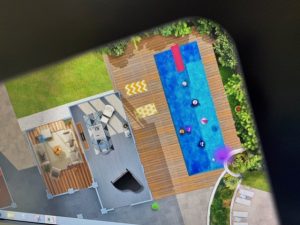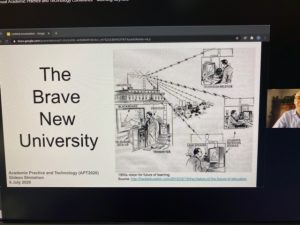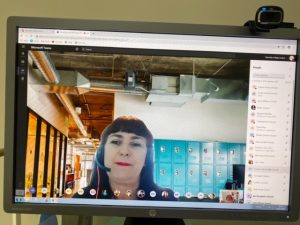The (virtual) 18th Academic Practice and Technology Conference (#aptconf)
12 presentation rooms, two keynotes and an amazing ‘high fidelity’ site for networking – well done to UCLs Simon Walker and Sandra Lusk leading the way with the virtual MSTeams conference.

Networking space with high fidelity
The team used MSLive Events for the keynotes, and Dr Gideon Shimison launched the event with his keynote ‘The Brave New University’ reflecting on what has really changed since the 1950s model of learning depicted in the cartoon. He outlined the ‘VUCA’ realities of today (Volatility, Uncertainty, Ambiguity an Complexity), suggesting a Cyber-Physcial model of learning where on site communities moved through stages of learn; master; communicate to a model of online open community. The Brave New University needs to move beyond the model to innovation and mixed realities, multi-modal interaction, mixed social networks. Spaced repetition and exams and from traditional programming of courses to mixed and adapting, with a truly student-centred focus.

Brave new classroom

Our session, ‘A humanising response to scaling at speed’ (Debbie Holley, Ian Donaldson and John Moran) explored the work the Department of Nursing Sciences undertook to scale at speed as third year Nursing Students prepared to undertake their final six months In practice, called up by the NHS to work to support the Covid-19pandemic. Drawing upon the work of Len Vygotsky, we scaffolded support using technology as the proxy for the ‘more capable peer’ (Cook 2010) . This body of work reflects the humanising value-set and community of practice approaches that underpin the whole of the Nursing Curriculum. We co-produced a ‘Corona Virus Teachinar’ Unit to host podcasts, tech chat show recordings, guest slots from experts, and created a ‘Digital Nurse’ Talis Aspire reading list to model the importance of exemplary online reading lists to complement moving our practices online.
Next, Sandra Lusk presented the UCL work on students experiences of the pandemic, emphasising the key need to ensure access to the online – we all echoed the examples shared of students, and staff, disadvantaged due to unreliable technology, lack of study space, poor internet access, and good learning design, thought through to meet the need of all is essential moving forward.

Allison Littlejohn and Eileen Kennedy then presented on ‘The Challenges and Opportunities of the Rapid Move to Online teaching in Response to Covid-19′, once again highlighting inequalities, gender issues and the over reliance on live video conference platforms making teaching difficult and stressful with limited student engagement. Their recommendations:
Five key conclusions and recommendations from their research:
1. Support for online teaching and learning in the new academic year should focus on learning design that shifts the emphasis away from tutor presentation via video (Zoom etc)
2. Pedagogical support should be provided for ways of synchronous interaction and engagement with students
3. Learning design support should be provided for asynchronous student discussion and collaborative activity
4. Online short and flexible ie Just in Time professional development should be provided to allow tutors to gain first-hand experience of learning design and the use of tools to engage students
5. Ensure staff have sufficient time to develop their courses since development for online learning and teaching is heavily front loaded
 The always welcome JISC session saw Sarah Knight and Clare Killen discussed digital onboarding issues, and highlighted the importance of a joined up institutional approach. The guide to the JISC toolkit: supporting the digital experience of new students is essential reading for institutional, courses leaders as well as individual tutors designing their learning for the autumn and individuals preparing their units.
The always welcome JISC session saw Sarah Knight and Clare Killen discussed digital onboarding issues, and highlighted the importance of a joined up institutional approach. The guide to the JISC toolkit: supporting the digital experience of new students is essential reading for institutional, courses leaders as well as individual tutors designing their learning for the autumn and individuals preparing their units.Clearly this is just a snapshot of sessions I was able to attend. The whole conference has been recorded and all sessions will be available from the conference website in due course. Link: https://aptconference.org.uk/index.php/apt/apt202








